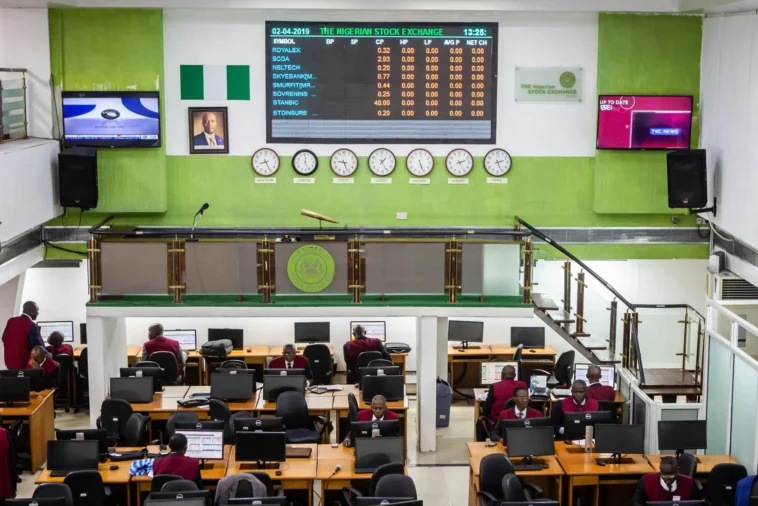Interest in the stock market has seen a surge among Nigerians. This increased attention on Nigeria’s stock market can be attributed to a multitude of factors. The investor portfolio has soared by over N40 trillion under the governance of the Tinubu administration. Nearly all the substantial stocks have followed a trend of exceeding the nation’s inflation numbers in the year 2024.
Presently, the all-share index on the NGX, Nigeria’s premier stock exchange, is at its apex in history. This stock market, the NGX, which lies at the heart of Nigeria’s financial performance, is becoming more recognizable and inviting to international investors. Measures indicating overseas involvement have reached their highest point in the last five years.
This financial buoyancy can also be ascribed to ongoing economic overhauls, the robust revenue of Nigerian businesses, differences in the exchange rate, the recapitalization movement in the banking sector, and modifications in the oil industry. The NGX is known for hosting highly-valued Nigerian companies and appealing to investors worldwide, thereby establishing an equitable, transparent, and properly overseen market.
Among the renowned companies listed on the NGX are Airtel Africa, Aradel Energy, BUA Cement, Stanbic IBTC, Nestle, Presco, Dangote Cement, FBN Holdings, MTN Nigeria, BUA Foods, Seplat Energy, GTBank, and Zenith, UBA, Transcorp Power, Geregu, each possessing a market worth of at least N1 trillion. Dangote Refinery has also initiated the process of listing for its petrochemicals on the Nigerian stock market, an act that is anticipated to bolster the country’s capital market significantly.
In a noteworthy trend in Nigeria’s capital market, every resident who possesses a net worth of a minimum of $1 billion has a substantial stake in the stock market. Included in this group is Africa’s wealthiest individual, Aliko Dangote. The market can be accessed by individuals via the direct purchase of securities when new ones are issued or by trading extant securities on the secondary market.
The Nigerian public is seeking out innovative avenues to interact with the capital market and amplify their income through participation in the stock market. A share or equity represents an ownership stake in a corporation, thereby entitling the bearer to potential advantages such as dividends or profits from selling the share at an elevated price at a later date.
From 10:00 am to 2:30 pm on weekdays, licensed Nigerian stockbrokers execute the transactions related to buying and selling shares. The values of these stocks fluctuate depending on supply and demand dynamics, providing investors with the opportunity to purchase at low costs and sell at higher prices.
An integral part of the Nigerian stock market landscape is the Central Securities Clearing System Plc (CSCS), which cooperates closely with conventional stock brokerage firms. The CSCS allows both domestic and foreign investors interested in trading on the NGX to maintain assets via CSCS, serving as the licensed central depository.
Fall under the purview of the CSCS are the clearing and settling of transactional activities related to stocks. Investors have the option to carry out this process either by using their designated dealer or a competent local custodian. To enter the market, one must acquire a primary understanding of relevant matters such as perusing a company’s earnings report or recognising the operational norms of the Nigerian stock market, major ETFs and the various stock market indices.
When opening an account with a brokerage firm, potential investors should consider factors such as ease of access, fees, including the initial deposit, reputation, reliability, and whether the firm is registered with the SEC. Interacting with regulated brokers, advisors, and products reduces the risk of falling prey to scams and financial losses.
Only retail investors are allowed to open personal accounts in the Nigerian stock market. Thus, individuals wishing to invest must first set up their own account. Furthermore, gaining a basic understanding of stock-related terms such as market orders and limit orders, and understanding the differences between them, are fundamental skills for all investors.
It is essential to scrutinize different economic elements that can influence stock prices, like inflation rates, political stability, and the performance of specific sectors. Every investment strategy comes with its own set of risks including those related to political, economic or currency fluctuations. It is imperative to identify these potential pitfalls; without an accurate understanding, applying these strategies could lead to financial loss.
One of the key attractions of investing in the Nigerian stock market is the prospect of building wealth through capital appreciation and dividend income. Furthermore, buying stocks can also promote economic growth in Nigeria. However, investing in the stock market is not devoid of risks.
Potential losses might stem from market instability, and the reality that not all companies perform as projected. Despite these risks, the promise of growth and opportunity in the Nigerian stock market seems to be fueling the growing interest among its citizens.

